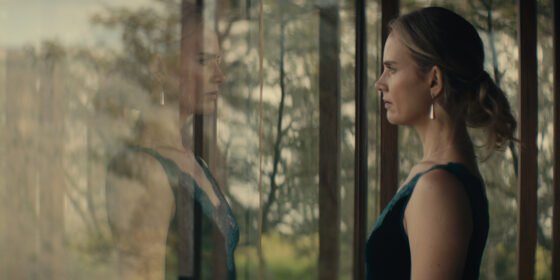TIFF 2021 | Lo Invisible (Javier Andrade, Ecuador/France)

By Angelo Muredda
Anahi Hoeneisen is inscrutable as a woman on the verge of either a breakdown or a breakthrough in Javier Andrade’s chamber drama Lo Invisible. Co-written by Hoeneisen and Andrade, the film unfolds, enigmatically at first and then tediously, as a series of opaque tableaux of protagonist Luisa’s tentative reintegration into family life following a stay at a psychiatric clinic for postpartum depression. Luisa’s blankness lends a universalist dimension to her character’s pain that makes the minimalist script feel purposeful, at least for a while: we assume she is hollowed out by her experiences, rather than just hollow, and clock the moments where maids and nurses dote on her scarred and tired body as a kind of spiritual resuscitation of a recently emptied vessel.
The same effect is achieved by the structural repetition of visual and aural motifs, like Luisa’s heavy breathing on the soundtrack amidst her panic attacks, the distanced sound of her child’s cries, and the detached following shots of her gliding through her elegant, glass-adorned mansion, which is all cellars and reflective surfaces. One wonders, given their successful commitment to rendering their protagonist so remote in this early stretch, why Andrade and Hoeneisen reach for tired shortcuts to our sympathetic investment in the last act. Luisa’s tin-eared monologue about her appreciation for her family’s many maids, gardeners, and hangers-on, not to mention her furtive romance with a driver, read as unconvincing, last-ditch efforts at characterization. Contra their intention, these late-game machinations constitute a heel turn—the whiny lament of the ruling class.
Angelo Muredda

